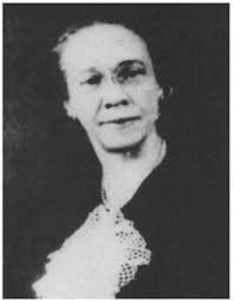
Mary Burrill
*Mary P. Burrill was born on this date in 1881. She was a Black teacher and playwright. Born in Washington, D.C., her father was John H. Burrill, and her mother was Clara E. Burrill.
She graduated in 1901 from Washington's M Street School (later Dunbar High School), entered Emerson College in the fall of that same year, and completed a three-year program in 1904. In 1905, Mary began her career as a teacher of English, with a major concentration in speech, diction, and dramatics at Armstrong Manual High School and Dunbar High. In 1929, she returned for postgraduate work in 1929. She received a B.L.I. (bachelor of Literary Interpretation) degree in 1930. During her junior year, Mary wrote Unto the Third and Fourth Generations: A One-Act Play of Negro Life. The play was published in the college yearbook in 1930 and earned the title "Best Junior Play of the Year."
During her early years of teaching, she wrote The Other Wise Man, a monologue she presented to high school and community audiences every Christmas season. Through her Dunbar years, which ended in 1944 when she retired and moved to New York City, Mary taught several students who distinguished themselves as playwrights: Willis Richardson (The Deacon's Awakening), May Miller (Graven Images), and James Butcher (The Seer). Among her prestigious colleagues at Dunbar was poet, essayist, and playwright Angelina Weld Grimké (Rachel), with whom she may have had a lesbian love affair.
Burrill never married and shared a house with Lucy D. Stowe, Howard University's first dean of women, her entire adult life in Washington. According to women studies scholar Gloria T. Hull, Mary exchanged ardent letters with Angelina, who called her "Mamie" and "little one," as early as 1896 when the two were still in their teens. At Dunbar, Mary wrote two one-act plays that position her as a notable playwright of the 20th century: They That Sit in Darkness and Aftermath. They That Sit in Darkness, written in 1919, was controversial for its time because it focused on "female [sexual] education as the means to escape poverty" and dealt directly with the issue of reproductive rights for women, a right not completely won until 1965.
It was published in a special edition of Margaret Sanger's progressive Birth Control Review (September 1919), "The Negro's Need for Birth Control as Seen by Themselves." Sanger, a birth control movement figurehead, established the first birth control clinic in Brooklyn in 1916. They That Sit in Darkness is also in Hatch and Shine's African American Theatre U.S.A. (1974). In the 21st century, Burrill would be termed a "feminist" writer. Aftermath, likewise, written in 1919, is part of the World War I literary canon to which Alice Dunbar Nelson ("I Sit and Sew"), Joseph Seamon Cotter, Jr. (On the Fields of France), and many other Black writers contributed.
Aftermath was published in Liberator, edited by socialist Max Eastman, and performed by the Krigwa Players on May 8, 1928. Set in rural South Carolina and written in the thick southern dialect, Aftermath is a period piece. The period was defined by lynching, race wars, and African American soldiers returning home from WWI combat to find that, though they fought for freedom abroad, they were second-class citizens at home. In this play, the veteran's father has been lynched, and the soldier seeks revenge. The debate of whether or not the black man should serve in war consumed the Harlem Renaissance (1920-1930) years between World War I and World War II. Mary P. Burrill died in New York on March 13, 1946.